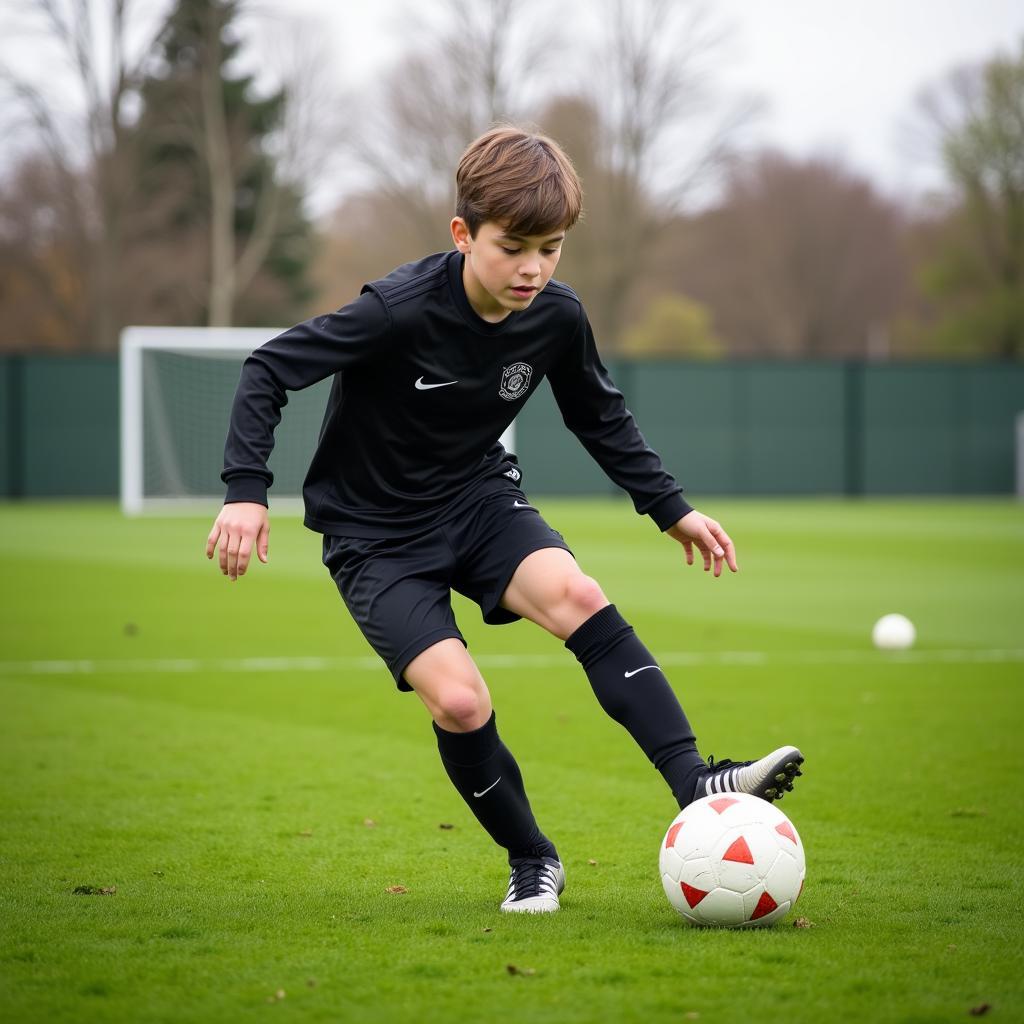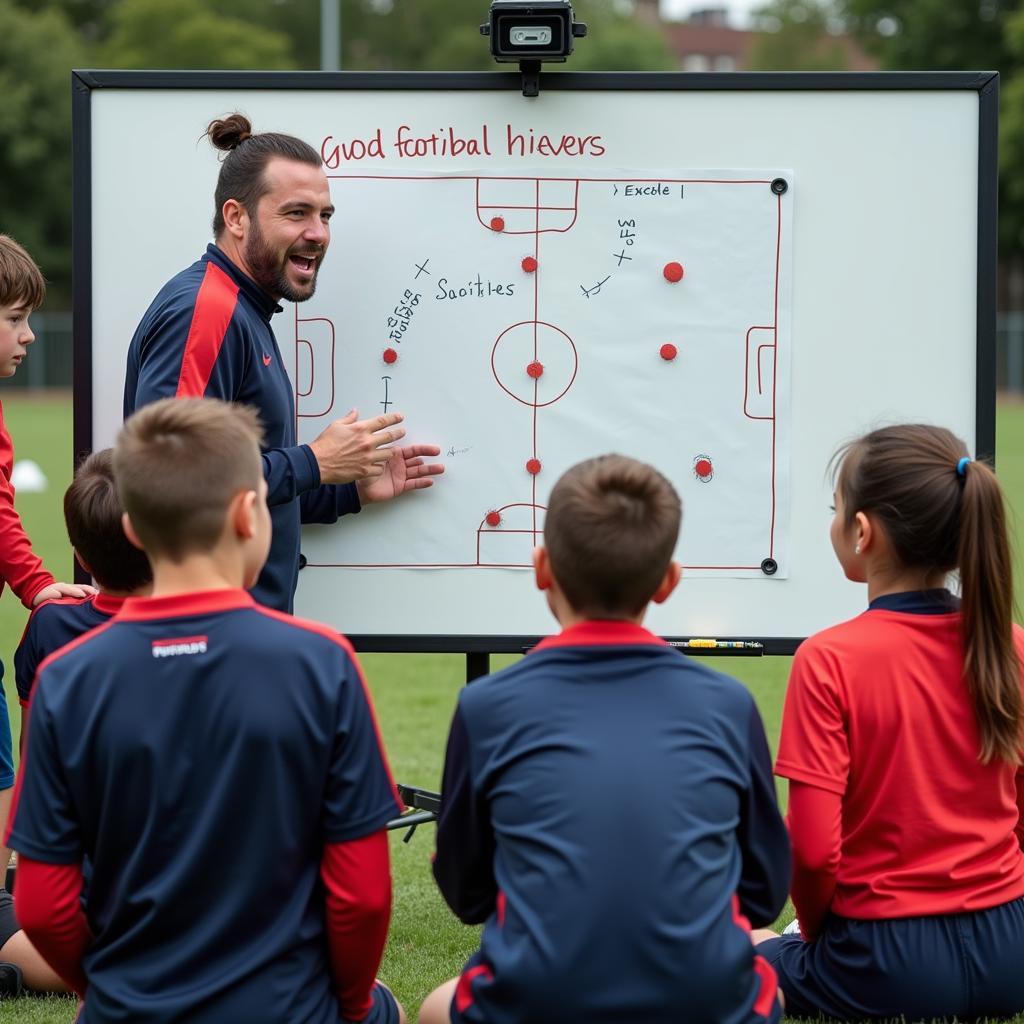Mastering the Junior Trade: A Footballer’s Guide to Early Success
October 20, 2024The beautiful game. A global passion. A dream shared by millions. For young players yearning to make their mark in professional football, the “Junior Trade” represents that critical first step, the launchpad to a fulfilling career. But navigating this path requires more than raw talent; it demands dedication, knowledge, and the right guidance.
 Young footballer training on field
Young footballer training on field
What Defines the “Junior Trade” in Football?
The term “junior trade” encapsulates the developmental phase of a footballer’s journey, typically spanning from early adolescence through the teenage years. It’s within these formative years that young athletes hone their skills, embrace tactical understanding, and cultivate the mental fortitude essential for professional football. Academies, youth leagues, and specialized training programs become their proving grounds.
Essential Skills for Junior Players
While natural talent plays a role, success in the “junior trade” hinges on a combination of technical, tactical, and physical attributes.
Technical Prowess: The Foundation
- Ball Mastery: This is non-negotiable. A junior player must command the ball like an extension of themselves, demonstrating confident dribbling, passing, and control.
- Accurate Passing: Football is a team sport. Crisp, precise passing forms the backbone of any successful team, dictating the flow of play.
- Shooting Technique: The ability to strike the ball cleanly and find the back of the net is crucial for any aspiring footballer.
 Football coach explaining tactics to his junior team
Football coach explaining tactics to his junior team
Tactical Acumen: The Mind of a Player
- Spatial Awareness: Understanding positioning on the pitch, anticipating opponent movements, and exploiting space are vital for creating scoring opportunities and defending effectively.
- Game Intelligence: This involves reading the game, making quick decisions under pressure, and adapting to ever-changing match situations.
- Communication: Effective communication with teammates is paramount, whether through verbal cues, hand signals, or simply understanding each other’s movements.
Physical Development: Building the Athlete
- Speed and Agility: The modern game demands quick bursts of speed, rapid changes in direction, and the agility to outmaneuver opponents.
- Strength and Endurance: A footballer needs the physicality to withstand challenges, compete for the ball, and maintain performance throughout a match.
- Injury Prevention: Proper warm-up routines, stretching, and a focus on injury prevention techniques are essential for long-term success.
The Importance of Mentorship and Guidance
Navigating the “junior trade” can be daunting. Young players need mentors who can nurture their talent, provide constructive feedback, and instill the values of discipline, sportsmanship, and resilience.
The Role of Coaches:
- Technical Development: Coaches play a crucial role in refining a player’s technical skills, identifying areas for improvement, and providing tailored training regimes.
- Tactical Understanding: They introduce young players to the tactical nuances of the game, teaching them formations, strategies, and how to analyze opponents.
- Mental Strength: Coaches act as mentors, fostering a positive training environment, building confidence, and equipping players with the mental tools to handle pressure.
 Junior footballers celebrating a victory
Junior footballers celebrating a victory
Parental Support: A Balancing Act
- Encouragement and Support: Parents play a vital role in providing emotional support, celebrating achievements, and offering encouragement during challenging times.
- Realistic Expectations: It’s important for parents to maintain realistic expectations, understanding that development takes time and focusing on the joy of the game.
- Open Communication: Maintaining open communication with coaches, respecting their expertise, and working collaboratively creates the best environment for a young player’s growth.
Making the Jump: From Junior to Professional
The transition from junior football to the professional ranks is a significant leap.
- Showcasing Talent: Participating in showcase tournaments, trials, and attracting the attention of scouts become paramount for players aspiring to play at higher levels.
- Academic Balance: Maintaining a balance between football and academics is crucial. A good education provides alternative options and fosters well-rounded individuals.
- Character and Commitment: Professional clubs look beyond technical ability. They seek players with strong character, unwavering commitment, and a professional attitude.
FAQs: Common Questions About the “Junior Trade”
1. What age is considered “junior” in football?
The definition of “junior” varies between countries and organizations, but generally encompasses ages 12 to 18.
2. How can I find the right junior club for me?
Consider factors like coaching quality, playing philosophy, competition level, and proximity when choosing a club.
3. How much time should I dedicate to training?
Training frequency depends on age, level, and individual goals. It’s important to maintain a balanced schedule that allows for rest and recovery.
4. What are scouts looking for in junior players?
Technical ability, tactical awareness, physical attributes, and mental toughness are all important factors that attract scouts.
5. How can I handle pressure and stay motivated?
Remember to enjoy the game, focus on personal growth, surround yourself with a supportive network, and celebrate small victories along the way.
Conclusion
The “junior trade” is a challenging yet rewarding phase in a footballer’s journey. By focusing on technical development, tactical understanding, physical preparation, and mental fortitude, young players can lay the groundwork for a successful career. Remember, football is a journey of continuous learning and development. Embrace the challenges, learn from your experiences, and never stop chasing your dreams. For any inquiries or assistance regarding your footballing journey, feel free to reach out to us. Contact us at Phone Number: 0963418788, Email: [email protected] Or visit our address: 2M4H+PMH, Nghĩa Thành Ward, Gia Nghĩa City, Đắk Nông Province, Vietnam. We have a 24/7 customer support team.